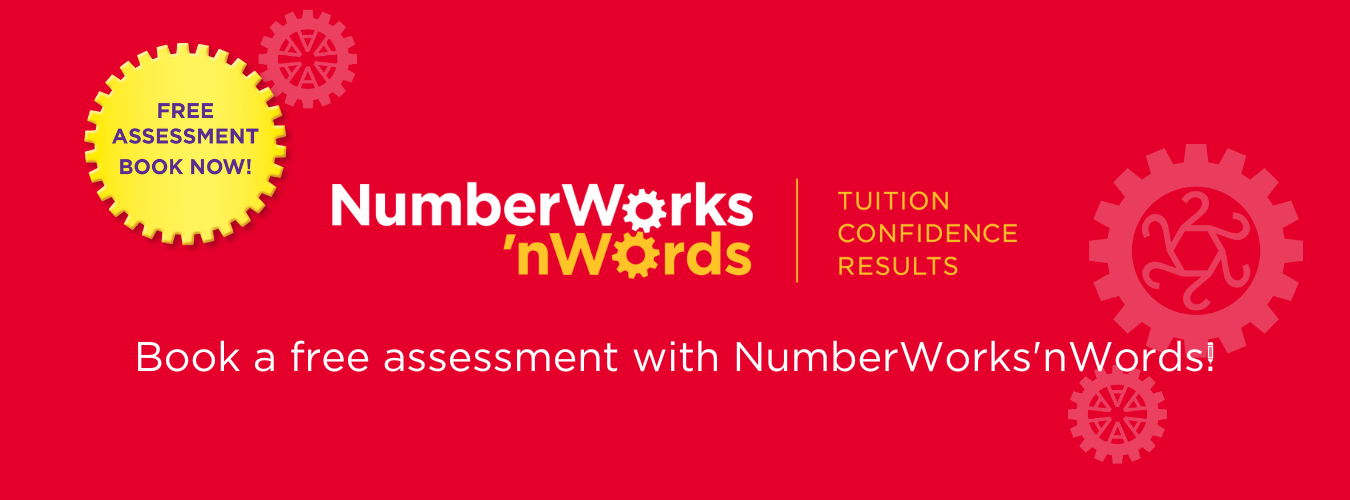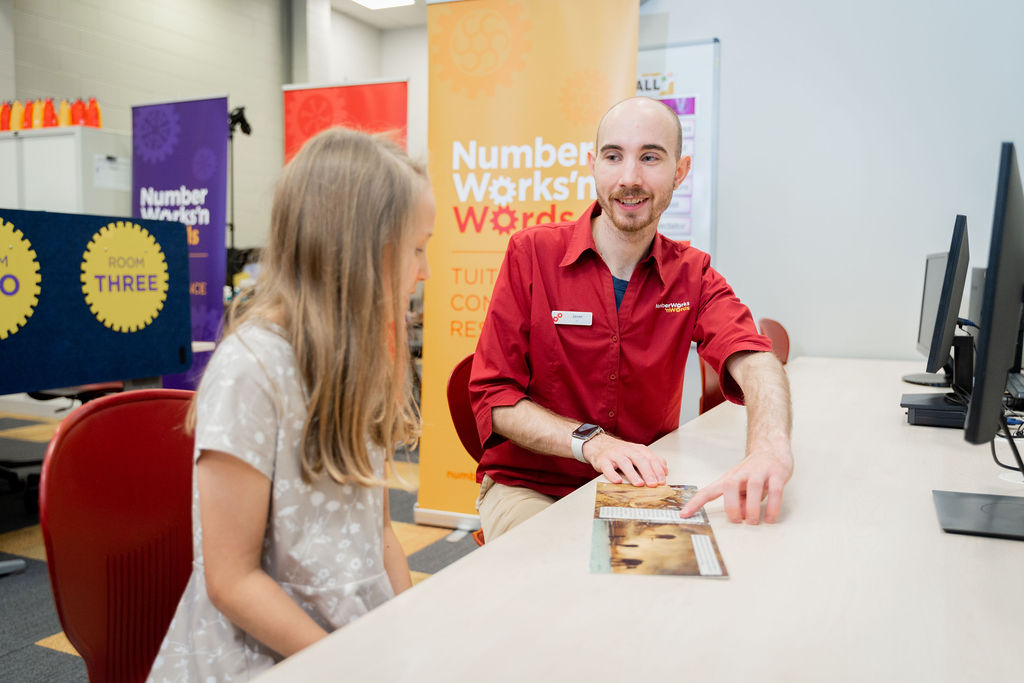Mindfulness for Children these School Holidays
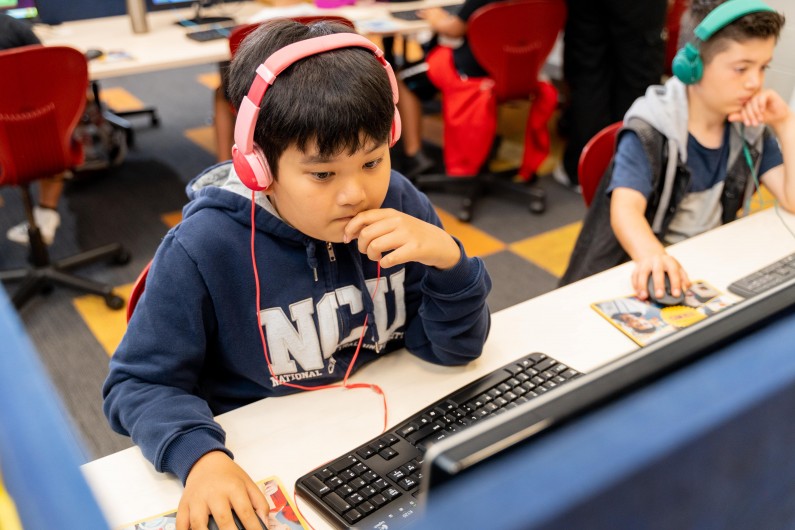
The school holidays are a great time for families to spend time together and relax after a busy Term. These holidays, why not introduce your children to the practice of mindfulness?
Mindfulness is the practice of focusing one’s awareness on the present moment, while calmly acknowledging your surroundings, sensations, feelings and thoughts without letting them cause distraction or judgement.
It is a skill that can be highly supportive and beneficial for children both emotionally and academically.
In this blog, we deep dive into the benefits of mindfulness for children and activities you can introduce during these Easter school holidays to encourage mindfulness as a regular enjoyable practice within your household.
Is your child struggling to keep up with schoolwork? Are they falling behind? Are they bored in class? Or are you looking for extension work for your child? Check out our eBook to learn more about how we help your child improve academically and build confidence through our in-centre after-school tuition.
Improving children’s ability to regulate their emotions
Evidence suggests mindfulness can improve emotion regulation and recovery in children. This research found a direct correlation between practising mindfulness and enhanced emotional regulation, as children were able to learn, observe, and identify their emotions and feelings more clearly and consistently.
The findings also indicated that mindfulness not only promotes healthy emotion regulation but also reduces the intensity of distress. Children who practised mindfulness were able to constructively manage emotions, thoughts, and feelings in a healthy manner. This means incorporating mindfulness practices into your children's lives may be a beneficial approach to supporting their emotional regulation and recovery abilities.
Secondly, mindfulness can reduce stress and anxiety in adults and children, as it teaches us how to respond to stressors with awareness and self-compassion, rather than reacting impulsively to situations.
In this study, participants who practised mindfulness reported lower perceived levels of stress. Because stress also impacts our overall well-being, the reduction in stress also meant participants had better mental health and ‘executive function’; which refers to our ability to juggle multiple tasks, plan, set goals and focus.
Understanding ourselves and others
Mindfulness - paying attention to one’s current experience in a non-judgmental way, helps us learn more about our own personalities and become more self and socially aware, according to a new report. These learnings are especially important to demonstrate to children, as they are developing an understanding and sense of self while learning and discovering new thoughts, emotions and sensations.
This report also indicated that practising mindfulness encourages self-compassion, as children learn to be kind and compassionate towards themselves and in turn others. This can lead to more positive self-esteem, self-care and overall well-being.
Improved cognition
Mindfulness doesn’t just help children focus on their thoughts or help them stay calm, evidence suggests it can play a role in improving cognitive skills, such as working memory, cognitive flexibility, and decision-making abilities in children. These cognitive skills are said to help children to think flexibly and more clearly; improving academic performance, attention span, problem-solving, critical thinking and decision-making. Improved cognitive skills in children can lead to better academic performance and higher levels of academic achievement from a younger age.
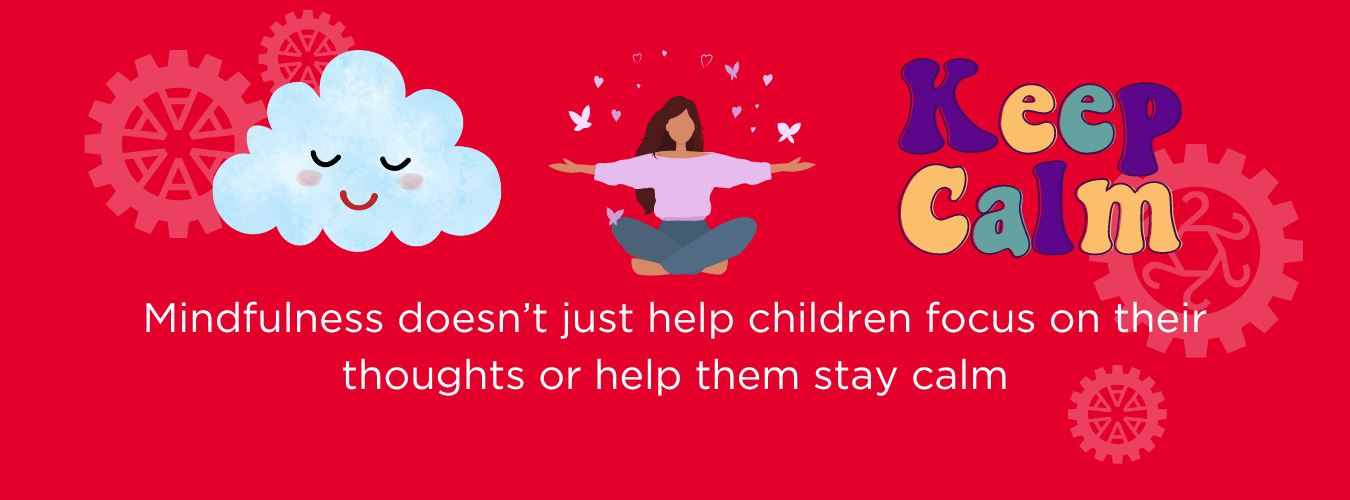
Developing empathy and resilience
Implementing mindfulness practices can promote empathy and compassion towards others. By being present and non-judgemental, children learn to listen attentively, communicate effectively and understand others’ perspectives. This can enhance their social skills, including empathy, active listening in the classroom and conflict resolution in the playground.
Finally, resilience is the ability to bounce back from challenges and setbacks. Mindfulness allows children to build resilience through positive mindset development, emotional awareness and self-regulation. This can support children in navigating difficult situations with more adaptability.
Getting Started with Mindfulness
Before getting started with mindfulness with your children, it’s important to have a conversation with them about what it is and why it’s important. You could explain that mindfulness is a way of paying attention to what’s happening in the present moment and that it can help them feel calmer and more focused, or that it involves fun activities like arts and crafts! You can also share some examples of when mindfulness might be helpful, such as when they are feeling stressed, nervous, angry or overwhelmed.
Secondly, it is important to create a space in their room or within the house dedicated to mindfulness that can help your child feel more comfortable and engaged with the practice. This way it becomes something your child looks forward to doing and a place they enjoy, rather than a chore.
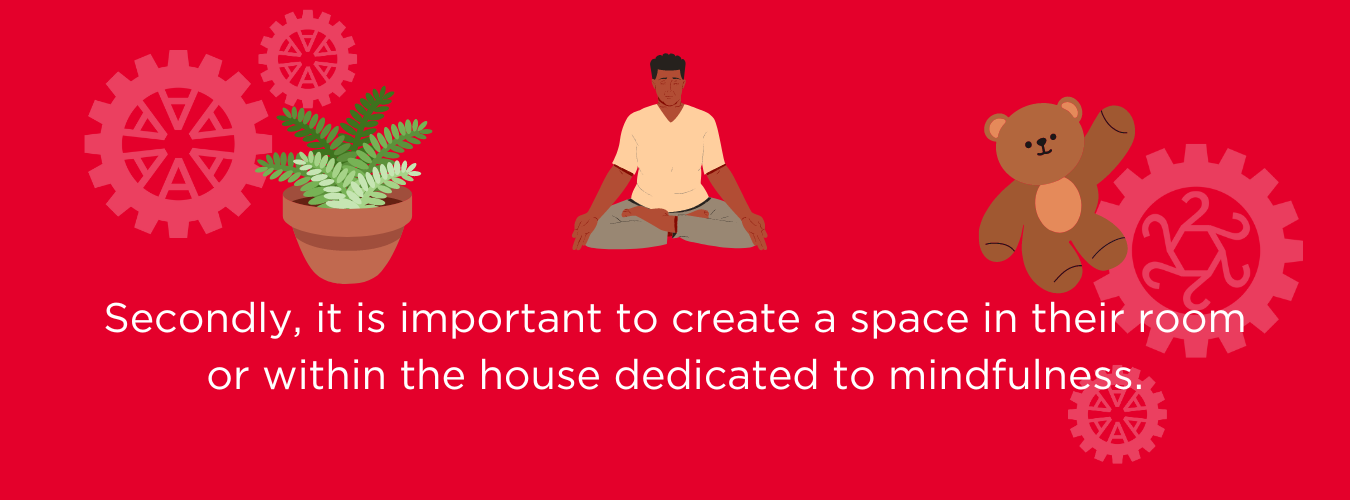
We recommend setting up a small corner with blankets, cushions, teddy bears, candles and plants that make your child feel calm and comfortable. This space can be used for mindfulness activities or an area for chilling out with little distractions, creating a positive association with the space and the practice.
Activities
To make it easier to get started, we’ve made a list of our favourite activities you could introduce to your child these school holidays to start building the practice of mindfulness:
Breath Work
One of the best ways to introduce mindfulness to your children is to practise breath work together. This means focusing on the breath as a way to anchor their attention to the present moment. Simply ask your child to pay attention to their breath as they inhale and exhale, and encourage them to notice the sensation of the breath in their nose and belly and help them to notice the things around them in silence. Breathing could be done, tucked up in bed before sleep, sitting outside in the sun, or laying on the grass looking at the clouds.
Guided Meditation
You could try introducing guided meditation to your child, which can be found online or through apps like Headspace or Calm. Practising mindfulness together with a guide can help your children feel more comfortable with the practice, making it a fun and engaging activity for the whole family to enjoy. Start with 5 minutes a day and gradually increase the time.
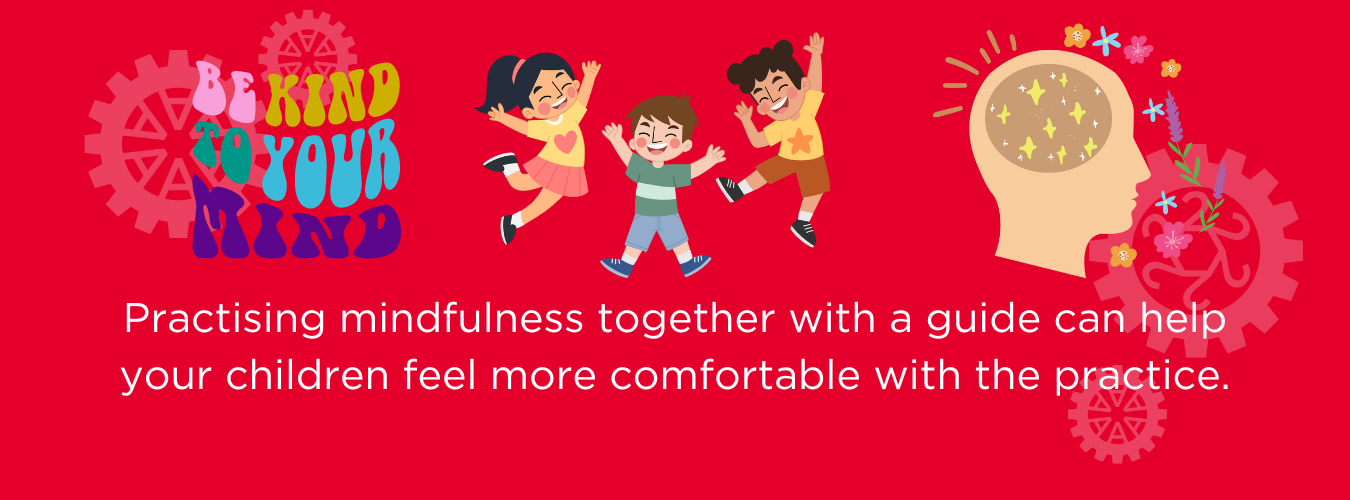
Creative Activities
If you have a more active child, a more practical ‘mindful art focus’ could be the way to go. There are many activities you could try, such as colouring, drawing, collaging, finger painting, puzzles or origami. Each of these activities helps them to focus on the colours, shapes and patterns they are creating and improves their creativity.
Walking
A successful mindfulness activity for children could be going with you for a walk around the local park, neighbourhood streets or out in a natural setting. As you walk, get them to count as many birds, animals or bugs they see. Encourage them to walk slowly and pay attention to all the sensations in their feet, the sounds around them and the creatures they see. This activity can connect them with the present moment and develop a deeper appreciation for their surroundings.
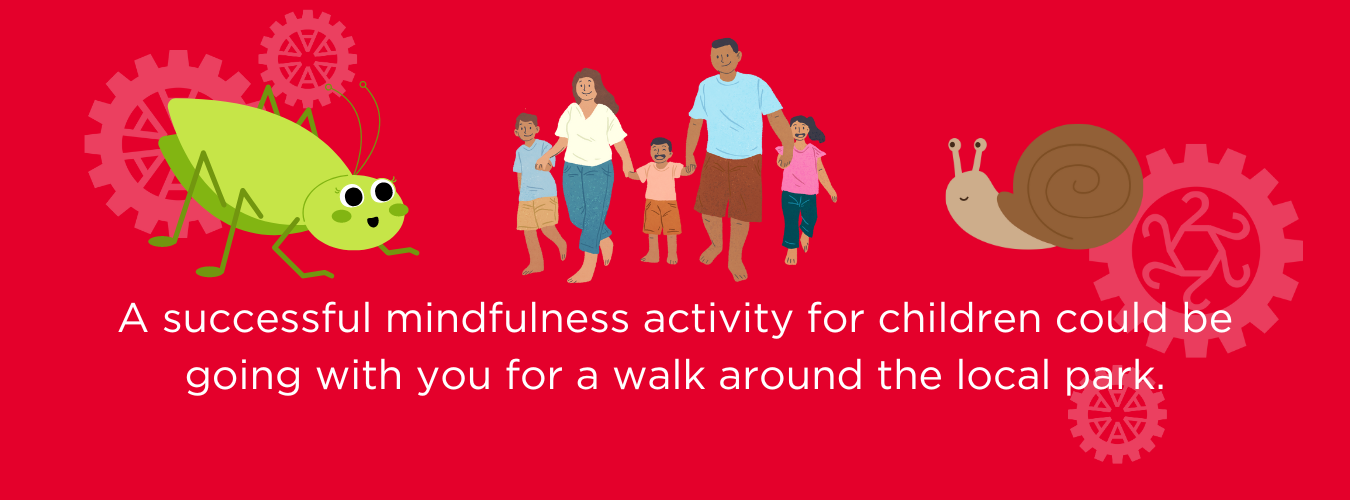
Gratitude
Practising gratitude is a form of mindfulness that can help children appreciate the good things in their lives. You can encourage your children to write down or share things they are grateful for each day, or even create a gratitude journal or jar where they can add notes about the things they are thankful for. By focusing on the positive aspects of their lives, your children can develop a more positive outlook and reduce stress and anxiety.
Introducing these activities to your children during these school holidays can be a fun and playful way to introduce them to mindfulness, encouraging curiosity, exploration and awareness of their surroundings and others. The key to incorporating mindfulness is to encourage your children to focus on the process, rather than the end result. Encourage them to engage their senses, be fully present at the moment and let go of distractions.

A regular mindfulness practice
Beyond the holidays, you can help your child build a mindfulness habit into their everyday lives by integrating it into daily routines. This is especially important, going into the next term when academics, extracurriculars and sports start to get busy once again.
Encourage children to take a few extra moments to practise mindfulness before starting homework, going to bed or even brushing their teeth. By making mindfulness a part of their daily routine, it can become a natural and easy practice for them to incorporate.
We hope you have gained some inspiration and ideas for how to introduce mindfulness to your children these school holidays and beyond!
At NumberWorks’nWords, our English and Maths tuition supports students with personalised learning programmes specifically catering to the individual needs of each student. Our expert tutors help young learners achieve their academic goals through the development of good learning habits and modelling positive behaviour through celebrating success and a nurturing environment.
If you would like to learn more about our after-school Maths and English tuition, get in touch with your local centre and book a free assessment!
